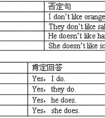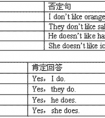David's friend don't want to _______any money to him, because he never returns anything he ______ from them.[ ]A. lend, lends B. lend, borrowsC. borrow, le-八年级英语
题文
| David's friend don't want to _______any money to him, because he never returns anything he ______ from them. |
|
[ ] |
| A. lend, lends B. lend, borrows C. borrow, lends D. borrow, borrows |
答案
| B |
据专家权威分析,试题“David's friend don't want to _______any money to him, beca..”主要考查你对 实义动词,主谓一致 等考点的理解。关于这些考点的“档案”如下:
实义动词主谓一致
考点名称:实义动词
- 实意动词:
即行为动词,表示动作的动词。实义动词与系动词是相对的,能独立用作谓语。
它分为及物动词和不及物动词两种:
及物动词是指后面要求有直接宾语的动词;
不及物动词指后面不需要跟宾语的动词。 实意动词使用方法:
及物动词
后面必须跟宾语意义才完整的实义动词,叫做及物动词(transitive verb)。如:
I believe that the committee will consider our suggestion.我相信委员会将会考虑我们的建议。
“How long can I keep the book ?”Harry asked.哈里问:“这本书我可以借多久?”
Dr. Bethune set us a good example. 白求恩大夫给我们树立了好榜样。
Crude oil contains many useful substances.原油含有许多有用的物质。
不及物动词
本身意义完整后面不须跟宾语的实义动词,叫做不及物动词(intransitive verb)。如:
Birds fly.鸟会飞。
It happened in June 1932.这件事发生于一九三二年六月。
My watch stopped.我的表停了。
She spoke at the meeting yesterday evening. 她在昨天晚上的会上发了言。
兼作及物动词和不及物动词
英语里有不少实义动词可以兼作及物动词和不及物动词。这样的动词又有两种不同的情况
a)兼作及物动词和不及物动词时,意义不变。试比较:
Shall I begin at once?我可以立刻开始吗?(begin作不及物动词)
She began working as a librarian after she left school.她毕业后当图书馆管理员。(began作及物动词)
When did they leave Chicago?他们是什么时候离开芝加哥的?(leave 作及物动词)
They left last week. 他们是上周离开的。(left 作不及物动词)
b)兼作及物动词和不及物动词时,有时意义不尽相同。如:
Wash your hands before meals.饭前要洗手。
Does this cloth wash well? 这布经得起洗吗?- 英汉实意动词用法比较:
与汉语的比较,有时英语动词的及物和不及物的用法,与汉语的用法不一样,请注意下列两种情况:
a)有的动词在英语里只能用作不及物动词,而汉语则可用作及物动词,如arrive到达,agree同意,listen听。英语里这些动词后面常接介词。如:
We arrived at the railway station at noon.
我们于中午到达火车站。(at不能省去)
(比较:We reached the railway station at noon.)
Everybody listened to the lecture with great interest.
每个人都很有兴趣地听讲课。(to不可省去)
(比较:We all heard the lecture.)
Do they agree to the plan?他们同意这个计划吗?(to不可省去)
b)有的动词在英语里能用作及物动词,而在汉语里则不能用作及物动词,如serve为…服务。
Our children are taught to serve the people wholeheartedly.
我们的儿童被教以全心全意为人民服务
用于be动词之后,实义动词之前。 实意动词的用法:
肯定句:
主语+动词过去式+其它
否定句:
主语+助动词didn‘t+动词原型+其他
一般过去式:
Did+主语+动词原型+其他
考点名称:主谓一致
- 英语中的一致主要包括主语和谓语在人称和数上的一致、时态一致、名词和其代词的一致。
主语和谓语保持一致叫主谓一致,即谓语动词的形式必须随着主语单、复数形式的变化而变化。 - 主谓一致原则:
1、语法上的一致
所谓语法一致原则,即主语和谓语的语法形式在人称和数上取得一致。
谓语的单、复数形式依据主语的单、复数形式而定:主语为复数,谓语动词用复数;主语为单数或者是不可数名词,谓语动词用单数。
China belongs to the Third World. 中国属于第三世界。
We are sure he will come. 我们肯定他会来。
使用语法一致的情况
(1)当主语是and,both…and连接的并列结构
如果主语指的是两个或两个以上的人或物,则谓语动词用复数。
My mother and I have seen the film. 我妈妈和我已看过这部电影。
Both rice and wheat are grown in this part of China. 在中国的这个地方既种稻子又种小麦。
注意:由and连接的并列主语前面分别有each,every,no修饰时,其谓语动词用单数形式。
Every boy and every girl has to receive education in our country. 在我国每一个男女孩子都得受教育。
No student and no teacher was invited to the party. 师生没有被邀请参加晚会。
(2)主语后面接说明主语的修饰语
主语后面接说明主语的修饰语如:
with,along with,together with,as well as,like,rather than,but,except,besides,including,in addition to,
谓语动词不受修饰成分的影响,仍保持同主语一致的关系。
The teacher with two students was at the meeting. 那位老师和两个学生参加了会议。
The girl as well as the boys has learned to drive a car. 这个姑娘和男孩子一道,也学会了开汽车。
A library with five thousand books is offered to the nation as a gift.一个有5000册书的图书馆作为礼物赠送给了国家。
E-mail, as well as telephones, is playing an important part in daily communication.电邮和电话在日常的通信中起着很重要的作用。
Nobody but Jane knows the secret.只有简知道这个秘密。
All but one were here just now. 刚才除了一个人外都来了。
(3)非谓语动词或从句作主语
非谓语动词 (动词的-ing形式、不定式)或从句作主语时,谓语一般用单数形式。
When and where to build the new factory is not decided yet.什么时候在什么地方建新工厂还没定下来。
Checking information is very important. 核实事实是非常重要的。
To learn foreign languages is not easy. 学习外语并非易事。
When we will hold the meeting is not decided yet. 我们何时开会尚未决定。
注意:当what引导主语从句或由 and连接两个动词不定式或动名词作主语时,谓语动词的数应根据意义一致的原则来决定。
What we need here is money.我们这里需要的是资金。
What we need here are workers.我们这里需要的是工人。
Lying and stealing are immoral.说谎与偷窃是不道德的。
(4)each和复合不定代词作主语
each和some/any/no//every十body/one/thing构成的复合不定代词:
anyone、anybody、anything、everyone、everybody、everything、someone、somebody、something、no one、nobody、nothing、each、the other作主语,谓语动词用单数。
Each is worse than the one before. 一个比一个差。
Nobody knows the answer. 没有一个人知道这答案。
Someone wants to see you. 有人想见你。
Is there anything in the box?箱子里有什么东西吗?
There is a lot of milk in the bottle. 瓶子里有很多奶。
(5)“many a +单数名词”作主语
“many a、(很多)/more than one(不只一个)+单数名词”作主语时,谓语动词用单数形式。
- 最新内容
- 相关内容
- 网友推荐
- 图文推荐
| [家长教育] 孩子为什么会和父母感情疏离? (2019-07-14) |
| [教师分享] 给远方姐姐的一封信 (2018-11-07) |
| [教师分享] 伸缩门 (2018-11-07) |
| [教师分享] 回家乡 (2018-11-07) |
| [教师分享] 是风味也是人间 (2018-11-07) |
| [教师分享] 一句格言的启示 (2018-11-07) |
| [教师分享] 无规矩不成方圆 (2018-11-07) |
| [教师分享] 第十届全国教育名家论坛有感(二) (2018-11-07) |
| [教师分享] 贪玩的小狗 (2018-11-07) |
| [教师分享] 未命名文章 (2018-11-07) |


![How much does it ______ to fly from Yancheng to Hainan Island?[ ]A. cost B. payC. spend D. take-七年级英语](http://www.00-edu.com/d/file/ks/4/2/shiyidongci/2020-01-05/small7dcf2f05998de63e10cc3629787031c81578210087.png)

![He always _____TV in the evening. He _____ listening to the radio. [ ]A. watch, don't like B. watches, doesn't like C. watching, don't like D. watch, do-七年级英语](http://www.00-edu.com/d/file/ks/4/2/shiyidongci/2020-01-05/small45d599b4a60b84e61cec210bfbf051f51578214524.png)
![I'd rather ___ to the Mcdonald's Restaurant because I like to listen to quiet music.[ ]A. to go B. going C. go D. went-八年级英语](http://www.00-edu.com/d/file/ks/4/2/shiyidongci/2020-01-05/small1767bba1727fef2c035c53dcbd9bc20e1578209517.png)
